| Leipziger
Gose |
Gose: the Beer
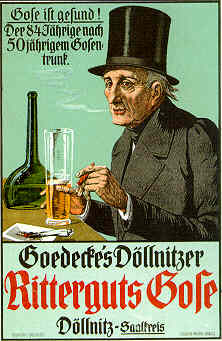 The
one really interesting beer, though hard to find in the city, does bear
its name: Leipziger Gose. One of the world's most obscure beer styles,
it's an isolated remainder of north Germany's pre-lager traditions. About
the only similar beer still brewed in Germany is Berliner Weisse,
though Gose seems to have at least as much in common with sour Belgian wheat
beers. The
one really interesting beer, though hard to find in the city, does bear
its name: Leipziger Gose. One of the world's most obscure beer styles,
it's an isolated remainder of north Germany's pre-lager traditions. About
the only similar beer still brewed in Germany is Berliner Weisse,
though Gose seems to have at least as much in common with sour Belgian wheat
beers.
It's a pale, top-fermenting wheat beer, flavoured with coriander and salt.
There is a hefty lactic acid content and was probably once spontaneously-fermented.
A description in 1740 stated "Die Gose stellt sich selber ohne Zutuung Hefe
oder Gest" ("Gose ferments itself without the addition of yeast"). I've
always suspected some sort of link with the gueuze of Brussels, though not
because of the similarity of the names. That, I'm sure is pure coincidence.
It's interesting that a source from 1927 says the following: "Gose
is a Leipzig speciality. It is similar to Berliner Weiße, but sourer
and not to everyone's taste. (Pour the bottle slowly.)" Now, Berliner
Weiße can be mouth-puckeringly sour and most modern drinkers can't
stomach it straight. I think that gives you an idea of just how sour Gose
must have been.
There was once a whole family of sour wheat beers, brewed right across the
North of Germany and the Low Countries, from Brussels to Berlin and beyond.
In Germany you had Broyhan, Berliner
Weisse, Gose, Lichtenhainer.
They were classified as Säuerliche
Bier by Professor Franz Schönfeld in 1904. Broyhan,
in particular, was brewed over a wide area and for a considerable length
of time: for at least 300 years after its birth in 1526, from Hannover to
Thüringen. In Belgium, there were Lambiek and several variations on
the Witbier theme.
The precise method of brewing Gose was a matter of great secerecy in the
18th and 19th centuries. The beer's popularity (and the premium price that
it commanded) made it an attractive proposition for any brewery. Naturally,
those already in the business of making it weren't too keen on their rivals
getting in on the act. The tricky part was getting the addition of the lactic
acid bacteria right. Sometime during the boil, the precise moment was of
great importance, a powder was added to the wort (according to a source
of 1872).
Another important characteristic of Gose that makes it very different from
other German beer of the 19th century is the method of conditioning. There
was no long period of lagering at the brewery. Gose was delivered, still
fermenting quite vigourously, in barrels to the Schänke. It was stored
in the cellar with the tap bung closed but the shive hole left open, so
that the still-active yeast could escape. Only when the fermentation had
slowed to a point where no yeast was emerging from the shive hole, was the
Gose ready to bottle. The barrel was emptied into a tank, from whence it
was filled into the characteristic long-necked bottles. These were not closed
with a cap or cork, but with a plug of yeast which naturally rose up the
neck as the secondary fermentation continued.
How long this conditioning lasted depended upon a number of factors, most
importantly the temperature outside. In the Summer an unlucky landlord could
see his whole supply turn to vinegar. The minimum period for a bottle to
mature was around a week. In warm weather a Gose would be considered undrinkable
after about three weeks. The trick for the landlord was in serving his Gose
at just the right degree of maturity. Some went so far as to have stocks
of beer of different ages, so regular customers could have their beer just
as they liked it.
You could consider this method as a sort of combination of the British tradition
of cask-conditioning in the pub cellar and the Belgian tradition of lambic
blending and bottling by pub landlords. The taste of the final product was
determined as much by what happened in the pub as in the brewery.
|
The
History of Gose
Gose has an odd history, having moved home several times in the 250 years
it has been around. It was first brewed in the early 18th century in the
town of Goslar, from which its name derives.
The beer became popular in Leipzig, so popular in fact that the local breweries
started to make it themselves. By the end of the 1800's it was considered
to be the local style of Leipzig and there were countless Gosenschänke
in the city.
A big contribution to the legend of Gose was made by Johann Philipp Ledermann.
In 1824 he started brewing Gose at Rittergut Döllnitz, a country
estate between Merseburg and Halle. He had been a brewer in Goslar,
but was lured by Johann Gottlieb Goedecke, the owner of the estate, to come
and brew for him. Goedecke's own attempts to brew the financially lucrative
Gose in the estate's small brewery had not been a great success. After Ledermann
died in 1852, his wife took over supervision of the brewing process until
her own death in 1883. By this time the brewery had managed to build up
a virtual monopoly in the supply of Gose to Leipzig.
Unlike most of their modern counterparts, the Rittergutsbrauerei Döllnitz
were happy to put a limit on the expansion of their business. For most of
the second half of the 19th century they were producing "around a million
bottles" of Gose a year. I make this an annual output of between 7,500
and 10,000 hl (I'm not sure how big the bottles were); not exactly mass
production. To put this figure in its historical context, around 1890 the
largest Munich breweries were pushing half a million hl a year, and even
the smallest could manage 20,000 hl.
|
Goslarisch Bier, Gose
genannt, wird in der kaiserl. freien Reichsstadt Goslar,
am Harz, mehrentheils aus Weizen gebrauet, ist anfänglich süß, und giebt
nachher einen Weingeschmack. Es ist unter den Weizenbieren mittelmäßiger
Natur, nähret sehr, erwärmet, erzeuget ein gutes Blut, und soll vornehmlich
ein Mittel wider den Stein seyn. Weil es sowohl eröffnet, als zugleich laxiret,
so haben Spötter diese unsaubere Scherzreime darauf gemacht: Es ist zwar
ein sehr gutes Bier, die Goslarische Gose; doch wenn man meint, sie sey
im Bauch, so liegt sie in der Hose. Auch wird es ein gutes Ehestands-Bier,
seiner Wirkung wegen, genennet. Man machet Brühen aus diesem Bier, die nicht
minder angenehm schmecken, als wenn sie von Wein zubereitet wären, und dem
Körper sehr gesund sind.
"Goslar Beer, called Gose,
is brewed in the imperial free Reichstadt Goslar,
in the Harz, mostly from wheat, is at first sweet, and then gives a wine
tatse. It is an average wheat beer, nourishes much, warms, produces good
blood., and is supposedly a means to combat gallstones. Because it both
relaxes and acts as a laxatiive, wags have made up thus dirty comic rhyme
It is indeed a good beer, Goslar Gose; though when you think its in your
belly, it's really in your trousers. It's also a good wedding beer,
because of how it works. If you use it to make broth, it will taste as bgood
as if made from wine, and is very healthy."
Source:
Oekonomische Encyklopädie
(1773) von J. G. Krünitz, p 5, 24.(my translation) |
The constant supply, but heavy demand, meant that the brewery
effectively rationed the supply of Gose. It was seen as a great favour if
they agreed to deliver to a new client. Each pub was allowed a specific
quantity of Gose, based upon their average number of customers. This policy
was, most likely, at least partly based upon the nature of the beer. A bit
like British cask beer, it was a living product with a limited shelf-life.
Only pubs with a steady stream of drinkers could turn over enough of the
beer to ensure that it was always in good condition. It appears that although
the beer was synonymous with the city, it was never really the everyday
drink of the masses. The majority of pubs never sold it and it was more
expensive than other beers.
|
The Decline of Gose
During the Second World War production of Gose, like all other beer, ceased
for a while. Worse was to come in 1945, when the Rittergutsbrauerei Döllnitz
was confiscated and closed. It appears that, at the time, it was the last
remaining Gose brewery. Only in 1949 did before Gose make a return, brewed
in the tiny Friedrich Wurzler Brauerei at Arthur-Hoffmann-Straße
94 in Leipzig. At this time there were a mere 18 pubs taking the beer.
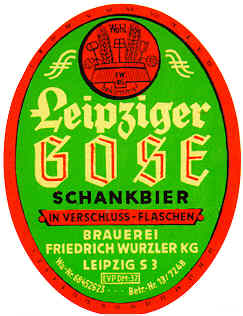 Friedrich
Wurzler had worked before the war in the Döllnitzer Rittergutsbrauerei.
After landing in Leipzig during the war, he was able to start his own brewery,
mostly based on the handwritten notebook in his possession, which explained
the secret of brewing Gose. Before his death in the late 1950's, he handed
on the secret to his stepson, Guido Pfnister. Brewing of Gose continued
in the small private brewery, though there appears to have been little demand.
By the 1960's there were no more than a couple of pubs in Leipzig and possibly
one in Halle that were still selling it. Friedrich
Wurzler had worked before the war in the Döllnitzer Rittergutsbrauerei.
After landing in Leipzig during the war, he was able to start his own brewery,
mostly based on the handwritten notebook in his possession, which explained
the secret of brewing Gose. Before his death in the late 1950's, he handed
on the secret to his stepson, Guido Pfnister. Brewing of Gose continued
in the small private brewery, though there appears to have been little demand.
By the 1960's there were no more than a couple of pubs in Leipzig and possibly
one in Halle that were still selling it.
Gose struggled along until 1966, when, while working in his garden, Guido
Pfnister had a heart attack and died. The local nationalised group, VEB
Sachsenbräu, had no interest in taking over the small run-down
Wurzler brewery and so it was closed. Another small private brewery, Brauerei
Ermisch, considered continuing the production of Gose and took possession
of Pfnister's brewing book. Their enthsiasm didn't last long and not only
was no Gose produced, but the notebook also appeared to have been accidentally
destroyed.
The last Gose was served in Hotel Fröhlich at Wintergartenstraße
14. Here they still carried on the tradition of buying barrels from the
brewery and bottling the beer themselves. The final barrel was delivered
on 31 March 1966. When the last of the bottles had been drunk, the customers
had to make do with Berliner Weiße.The hotel was never to see real
Gose again, being closed and then blown up in 1968.
|
Gose's
Revival
That would have been the end of the story and Gose would have become another
lost curiosity. In a strange parallel with Belgian witbier, the devotion
and determination of one man led to its rebirth. An enthusiastic publican,
Lothar Goldhahn, had decided to restore one of Leipzig's most famous
old Gosenschenke, Ohne Bedenken, to its former glory. He though that
it was only fitting that the revived pub should sell Gose. Goldhahn was
determined to resurrect the style and interviewed many old leipzigers to
ascertain its precise taste. More importantly, he was able to track down
a former employee of the Wurzler Brauerei who had at least some of Pfnister's
notes in his possession. The Getränke-kombinat Leipzig developed a
"Werkstandard zur Herstellung von Leipziger Gose" ("work
standard for the production of Leipziger Gose") based upon this recipe.
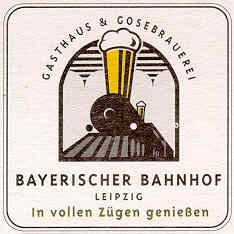 Goldhahn's
intentions to have his beer brewed locally in Leipzig were soon frustrated.
None of the local breweries had either the technology or the inclination
to brew such an odd top-fermenting beer, so he had to look further afield
for a producer. Eventually, a test batch of Gose was brewed in 1985, at
the Schultheiss Berliner-Weisse-Brauerei in East Berlin. At a tasting held
in Goldhahn's flat, a group of experienced Gose drinkers came to the conclusion
that it was a "real" Gose. The first production batch followed
in 1986 and Leipzig had Gose once more, if only in a single pub. Goldhahn's
intentions to have his beer brewed locally in Leipzig were soon frustrated.
None of the local breweries had either the technology or the inclination
to brew such an odd top-fermenting beer, so he had to look further afield
for a producer. Eventually, a test batch of Gose was brewed in 1985, at
the Schultheiss Berliner-Weisse-Brauerei in East Berlin. At a tasting held
in Goldhahn's flat, a group of experienced Gose drinkers came to the conclusion
that it was a "real" Gose. The first production batch followed
in 1986 and Leipzig had Gose once more, if only in a single pub.
Since then, Gose has once more been on its travels. In 1988 the Schultheiss
Berliner-Weisse-Brauerei decided that it couldn't be bothered brewing the
tiny quantities of Gose any more. For a while Ohne Bedenken had to resort
to serving Berliner Weiße again.
The third postwar Gose-free period ended in 1991, when Goldhahn bought the
small Löwenbrauerei in Dahlen. He now had total control of brewing
his own Gose. Sadly, the demand for Gose proved too limited even to keep
a small brewery fully occupied. Goldhahn was forced to sell it in 1995 and
look elsewhere for someone to contract brew for him. The Andreas
Schneider brewery in Weissenburg (Bavaria) duly obliged.
|
Gose Today
For the first time since before 1939 there are two breweries currently making
a Gose, both of them in Leipzig itself. It's still easier to find Kölsch
in the city, so Gose hasn't been restored to its former popularity, but
the style is more secure today than it has been for any time in the last
50 years.
In 1999 a new brewpub opened in central Leipzig, which places great emphasis
on the Gose it brews. It's so committed, to the style that it's even part
of its name:Gasthaus
& Gosebrauerei Bayerischer Bahnhof. This now supplies Ohne Bedenken
and a few other pubs in the city. Obviously the Andreas
Schneider brewery got bitten by the Gose bug whilst brewing for
Goldhahn, because it is the owner of the brewpub. Maybe it's just me, but
I find it very amusing for a Bavarian-owned brewery to be brewing a non-Reinheitsgebot
beer.
The good news just keeps coming: another Leipzig brewery, Ernst
Bauer, started brewing a Gose in 2002. The beer is being brewed
under contract for Adolf Goedecke, a descendant of the owners of the Rittergut
Döllnitz. According to a text from 1824, it was in the Rittergut that
the only real Gose was brewed. This beer is also available in Ohne Bedenken
and a few other outlets.
Sources:
"Gose Häppchen:100 Jahre Gosenschenke Ohne Bedenken", 1999,
pages 13 - 63
"Die Geschichte der Gose" Otto Kröber, 1912.
"Die Biere Deutschlands" Höllhuber & Kaul, 1988, pages
342 - 344. |
Gose
Links
These are a couple of links to articles by Michael Jackson about Gose:
Article about
new Gose brewpub.
General article
about Gose.
For those of you who can read German, here are some more Gose links:
Der Gose-Wanderweg
von Leipzig nach Halle.A very interesting guide to walks between Leipzig
and Halle. It's underlying theme is Gose and it lists an impressive number
of (mostly) country pubs serving the beer.
Leipziger Gose A site dedicated
to this very special beer.
|
| Gosenschenke
'Ohne Bedenken' |
Menckestr. 5
04155 Leipzig
Tel. 0341 566 2360
Fax: 0341 5662310
E-Mail: info@gosenschenke.de
Homepage: http://www.gosenschenke.de/
|
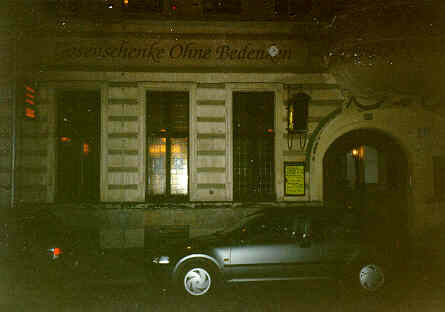 |
| Opening hours: Mon - Sun: 17:00-01:00 |
| Number of draught beers: 5 |
| Number of bottled beers: +-10 |
| Regular draught beers:
|
Food: Snacks, meals.
Prices: meals €5-18, gose €2.80 a half litre. |
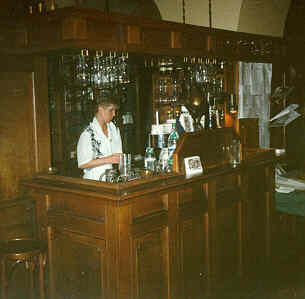 At
the end of the 19th century, when Gose was at the peak of its popularity,
there were dozens of Gosenschenke in Leipzig. Ohne Bedenken belongs to this
period, being built in 1899 in the suburb of Gohlis at a time when Leipzig
was expanding rapidly in size. It was for a decade the only pub in the world
selling this legendary beer. At
the end of the 19th century, when Gose was at the peak of its popularity,
there were dozens of Gosenschenke in Leipzig. Ohne Bedenken belongs to this
period, being built in 1899 in the suburb of Gohlis at a time when Leipzig
was expanding rapidly in size. It was for a decade the only pub in the world
selling this legendary beer.
The building was damaged in wartime air-raids, but struggled along until as a pub
until1958. After lying empty for a while, it became a Kulturzentrum for DDR soldiers
in 1960. In 1968 a nearby polyclinic took it over for use by its X-ray department.
When they left in the 1970's, the historic pub again remained unused for many years.
An article, published in the local Leipziger Blätter newspaper in 1983, evoking
memories of Gose and Ohne Bedenken caught the attention of Lothar Goldhahn. He visited
the premises, saw their potential and decided Leipzig deserved to have at least one
remnant of its Gose culture preserved. Somehow persuaded the DDR authorities to let
him restore and re-open Ohne Bedenken in the mid -1980's.
It seemed logical that a Gosenschänke should offer its customers a Gose. This
caused him two big problems: what did Gose taste like and who could brew it for him?
His first Gose, perfected after much research amongst older drinkers, was brewed in
Berlin at the Schultheiss Berliner Weisse brewery.
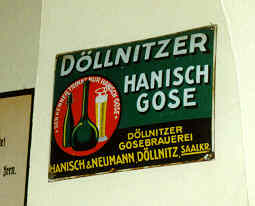 Obtaining
a supply of Gose has never been an easy matter. Between 1988 and 1991 he
had to make do with Berliner Weisse. From 1991 to 1995 Goldhahn ran his
own small brewery, but the limited demand for Gose made this economically
unviable. The pub currently sells both of the Goses made in Leipzig (and
the world, for that matter). Obtaining
a supply of Gose has never been an easy matter. Between 1988 and 1991 he
had to make do with Berliner Weisse. From 1991 to 1995 Goldhahn ran his
own small brewery, but the limited demand for Gose made this economically
unviable. The pub currently sells both of the Goses made in Leipzig (and
the world, for that matter).
The interior has been restored to something akin to its original state and is stuffed
full with Gose memorabilia in the form of old advertisements and bottles. The style
is similar to that of traditional beerhalls throughout Germany in its comfortable,
uncomplicated design. For those intimidated by the sourness of straight Gose, a selection
of Gose cocktails are available.
The combination of a traditional, cosy atmosphere and friendly, enthusiastic staff,
make it by far the best pub I've found in Leipzig or, for that matter, anywhere in
the old DDR. The only drawback is its inconvenient location, in a northern suburb
about a kilometre and a half away from the city centre. If you don't fancy the walk,
you can take a number 11 tram from the Hauptbahnhof.
|
| Rating: ***** |
Public transport: |
| Gasthof
and Gosebrauerei Bayerischer Bahnhof |
Bayrischer Platz 1
04103 Leipzig
Tel. 0341 1245760
Fax: 0341 1245770
email: info@bayerischer-bahnhof.de
http://www.bayerischer-bahnhof.de
|
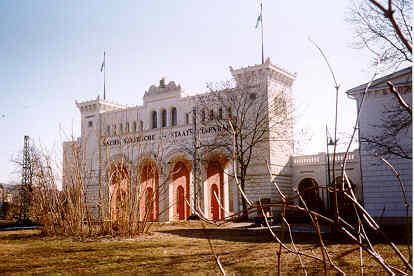 |
| Opening hours: Mon - Sun: 11:00-01:00 |
| Number of draught beers: 4 |
| Number of bottled beers: 1 |
| Regular draught beers:
|
| Food: Snacks, meals. |
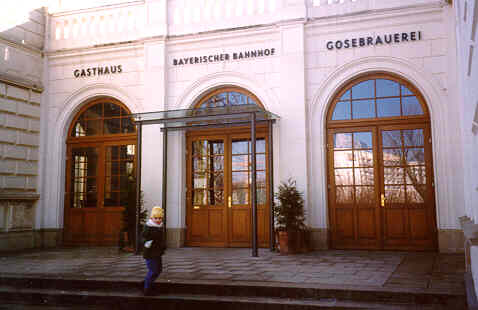 Considering
that this was Leipzig's main station until the massive Hauptbahnhof was
completed in 1915, it's oddly difficult to find your way into this pub.
It's quite a challenge picking your way through the wasteland of shrubs
that shield it from the Bayrischer Platz. Considering
that this was Leipzig's main station until the massive Hauptbahnhof was
completed in 1915, it's oddly difficult to find your way into this pub.
It's quite a challenge picking your way through the wasteland of shrubs
that shield it from the Bayrischer Platz.
Constructed in 1842 and supposedly the oldest terminal building still standing,
it was badly damaged in the war, though continued in use during the DDR
period. Left to rot through lack of funds, it was saved from threatened
demolition by being listed as a monument (Denkmalschutz) in 1975. In 1999
Deutsche Bundesbahn sold the building to allow it to be restored and converted
into a brewpub. The platforms are still used as an S-Bahn station (though
they are in such a state that you could be excused for thinking that they
were disused).
As you would expect from a building that had been a major station, it's
made a pretty decent-sized pub. Running parallel to the platform is a long
thin room, which has the bar counter against one wall and the brewing equipment
at the very end. Around the bar is an area of informal seating, from which
you can appreciate some of the more whimsical design elements. Mounted in
the bar is a DB station clock and the footrail for those seated on the sttols
in front of it has been made from a piece of railway track. Just inside
the main entrance is what appears to be an old guard's van, which houses
a single table. I was impressed by both the subtlety and ingenuity of the
theming, if theming is what you can call it.
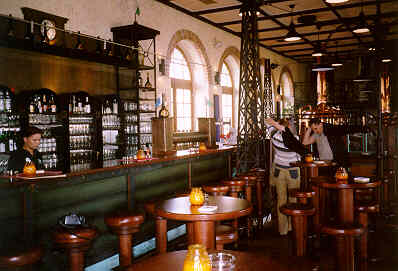 There
are further dining areas to the right of the entrance and function rooms
on both the ground and first floors. Outside is a beer garden. One of the
most impressive features is a magnificent staircase, that you only pass
through on the way to the toilets. A bit of a shame to miss it, so be sure
to get enough beer down you to require a trip to the gents. There
are further dining areas to the right of the entrance and function rooms
on both the ground and first floors. Outside is a beer garden. One of the
most impressive features is a magnificent staircase, that you only pass
through on the way to the toilets. A bit of a shame to miss it, so be sure
to get enough beer down you to require a trip to the gents.
The beers are all unfiltered. Obviously, the big attraction for the dedicated beer-tourist
(which I assume you probably are) is the house-brewed Gose. It's served in the correct
tall, cylindrical glasses and can be ordered in all sorts of cocktail forms. One at
least - Regenschirm, made with Kümmel (cumin) liqueur - has a long history, stretching
back to the 19th century.
I hate to say this about such a good beer (or for that matter anything negative
about such a laudable enterprise), but I don't think that it is totally
authentic. I've drunk Gose from three other breweries. Their beers were
reasonably similar and, for me, of quite a different type to the Bahnhof's
Gose. Now it's possible that the reason for this is the Reinheitsgebot.
I have the feeling that the others have stuck to it, and so have omitted
the coriander and salt. Perhaps it's just the coriander aroma - so startling
unusual in a German beer - has tricked me into thinking that it's a Belgian
witbier. I would welcome anyone's comments on this subject. E-mail
me here.
The other house beers are all outstanding examples of their styles. The Weißbier
is such a good imitation of Schneider Weisse, that I had to ask the staff to make
certain it is their own beer. Their brewer is evidently a very skilled man.
The standard is as good as I have found in any new German brewpub.
The Gose is available to take away in the traditional long-necked bottles
(a bit like cognac ones). However, a quick consultation with your financial
advisor might be in order first: a 75cl bottle costs a few cents under 10
euros. The label is, as far as I am aware, unique in listing coriander and
salt amongst the ingredients, yet still calling the contents beer. This
is usually a real no-no in Germany, where the Reinheitsgebot
is still god. As it turns out, The Reinheitsgebot
doesn't only allow malt, hops and water as advertised. There are
get-out clauses for top-fermented beers (they can use sugar) and beers deemed
to be "local specialities" (like Gose), which can use what the
hell they like. If you're interested in reading more of me slagging off
the stupid German beer law, then look here Why
the Reinheitsgebot is a load of old bollocks .
Owned by the Andreas Schneider
brewery of Weissenburg in Bavaria.
|
| Rating: ***** |
Public transport: tram 2, 9 or 16 to Bayrischer Platz |
| Sinfonie |
Gottschedstr 15,
04109 Leipzig
Tel. 0341 980 0546
|
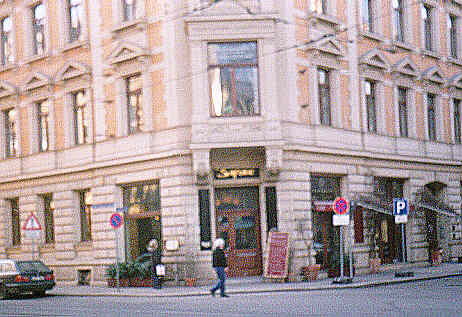 |
| Opening hours: Mon - Sun : 11:00-open end
|
| Number of draught beers: 6 |
| Number of bottled beers: 10 |
| Regular draught beers:
|
| Food: Snacks €4-8, meals €8-13, beer €2.90 0.5l.
|
Doing the research for these pages can sometimes be a depressing experience.
Poor quality beer, uninterested and incompetent bar staff, cheap crappy décor
- all of these I have to endure on a regular basis. Then there are other moments,
when, just as you weren't expecting it, you stumble across something special. Sinfonie
most definitely belongs to the lattter category of experiences.
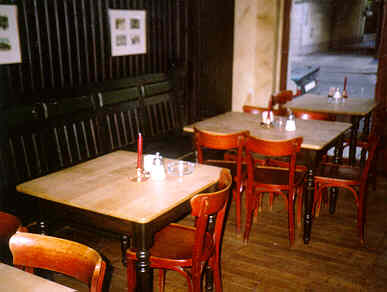 Located
on the eastern edge of the city centre, it's a corner pub of a decent size, mostly
done out in a modern, trendy way. I found it rather schizophrenic that there was a
small side room with a completely different character. It had panelled walls, pine
tables and, on closer inspection, an amount of Gose memorabilia scattered around.
I was soon to discover the reason for this odd combination of styles. Located
on the eastern edge of the city centre, it's a corner pub of a decent size, mostly
done out in a modern, trendy way. I found it rather schizophrenic that there was a
small side room with a completely different character. It had panelled walls, pine
tables and, on closer inspection, an amount of Gose memorabilia scattered around.
I was soon to discover the reason for this odd combination of styles.
I was there at a quiet time of day. I was making notes and drinking an excellent Gose,
when I was approached by a man who politely asked what I was doing. The face of the
landlord, for this is who he was, lit up when I mentioned my interest in Gose. "Do
you want to see my Gosenschänke?" (I must try using this as a chat-up line)
he said and took me into the above-mentioned side room. You can see a photo of it
to the left. While showing me around he described the history of Gose with a good
deal of knowledge, even mentioning the possible connection with Belgian gueuze. He
then proceded to highlight the faults of most of the recent recreations, demonstrating
an outstanding appreciation of the characteristics of the style.
The man's enthusiasm for Gose and the effort he had expended not only to
serve the beer, but also recreate the atmosphere of the pubs that sold it
a century ago, made a deep impression on me. It's only because of the energy
and determination of such people that oddities like Gose continue to exist.
I urge you all to visit his pub and show him some support.
The beer selection, especially in the spread of different styles, is most
unusual for the city. And I can only concur with the landlord - the Döllnitzer
Ritterguts is the best and most authentic Gose. I didn't come across it
often in Leipzig, but it can be found in another pub on Gottschedstraße,
Vodkaria (number 15). A Look
here for a list of other outlets.
I've had reports that this bar is being renovated and is not open for business.
|
| Rating: ***** |
Public transport: |
| Brauerei
an der Thomaskirche |
Thomaskirchhof 3-5,
04109 Leipzig
Tel. 0341 212 6110
Fax: 0341 - 212 6120
E-Mail: info@brauhaus-thomaskirche.de
http://www.brauhaus-thomaskirche.de
|
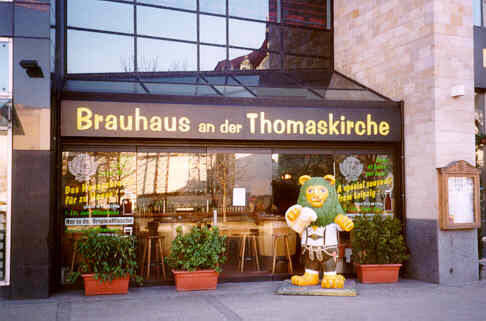 |
| Opening hours: Mon - Sun : 11:00-24:00 |
| Number of draught beers: 3 |
| Number of bottled beers: |
| Regular draught beers:
|
| Food: Snacks €4-8, meals €8-13, beer €2.80 0.5l.
|
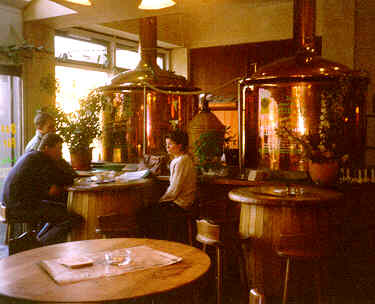 This
brewpub is at once both easy and yet potentially tricky to find. You would
need to be a master of disorientation to be unable to spot the Thomaskirche,
a splendid church that is one of Leipzig's landmarks. This
brewpub is at once both easy and yet potentially tricky to find. You would
need to be a master of disorientation to be unable to spot the Thomaskirche,
a splendid church that is one of Leipzig's landmarks.
What causes the problem is the address: a tiny deadend street next to the
church has the sign Thomaskirchhof. Don't be fooled, the pub is really on
a square that forms an extension to the Markt. I can't help you out much
with a description of the building, since that is as lacking in distiguishing
features as most modern edifices. My best advice is to look for the fibre
glass lion with a beermug in his hand.
The Brauhaus is wonderfully schizophrenic. Most of it is a rustic Italian restaurant,
where old bits of wooden farming kack are draped around the walls. This forms the
large section to the right of the entrance and there is another bit in this style
behind the bar rambling back towards the kitchen. To your left on entering, is a much
smaller area of high tables and stools. It's sandwiched between the tackily rural
bar counter (oh no, it's got a little tiled roof) and the copper brewing vessels.
They are very strangely located basically in the front window. Maybe they want to
make sure that you can see this really is a brewery.
The use of natural materials - wooden furniture, tile floors - is pleasing,
but the main room is far too bland and food-orientated for my taste. The
"beer corner" - see the photo above - is much more comfortable,
but of limited size (I've managed to get about half of it in the picture).
I did find the staff (and judging from the Italian I heard being spoken
amongst them, a number genuinely are from Italy) friendly and helpful,
which always helps me leave a pub a happy man.
I didn't consider the beers to be anything to get excited about. The Dunkles was by
far the better of the two. Perhaps the Pils was just having an off day. We are talking
about very small-scale brewing here, so some variation is to be anticipated. There
is the great advantage of the very central location - the Rathaus is within 100 metres
- to be taken into consideration. For that reason alone, it would be on any pubcrawl
I planned in the town centre.
|
| Rating: *** |
Public transport: |
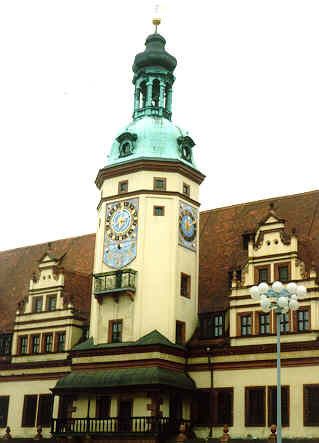 Neglected
by the DDR regime, which put all its money and effort into Berlin, Leipzig's
turn-of-the-century tenements had been quietly crumbling away for decades.
Now something is being done to improve the lamentable housing the city has
inherited, but it hasn't necessarily helped the ordinary citizen. The old
buildings are either being renovated for the 'luxury' market, or demolished
and replaced by new luxury flats. As a consequence some areas are full of
very classy looking buildings, but walk around at night and you'll notice
scarcely a window is illuminated. The rents are so high that very few can
afford them and many of the flats lie empty. In contrast, the prefabricated
concrete suburbs built in the 70's and 80's are full to bursting.
Neglected
by the DDR regime, which put all its money and effort into Berlin, Leipzig's
turn-of-the-century tenements had been quietly crumbling away for decades.
Now something is being done to improve the lamentable housing the city has
inherited, but it hasn't necessarily helped the ordinary citizen. The old
buildings are either being renovated for the 'luxury' market, or demolished
and replaced by new luxury flats. As a consequence some areas are full of
very classy looking buildings, but walk around at night and you'll notice
scarcely a window is illuminated. The rents are so high that very few can
afford them and many of the flats lie empty. In contrast, the prefabricated
concrete suburbs built in the 70's and 80's are full to bursting. 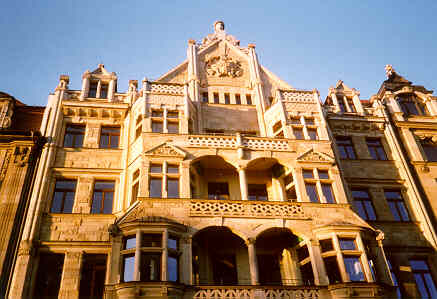 In
the days when it was East Germany's second city, Leipzig was a pretty dismal
place to attempt a pub crawl. The city centre had very few places to drink
and you had to reckon on queuing up for a while before getting a chance
to quench your thirst. The staff could have some weird ideas about what
was acceptable behaviour. I fondly recall being told to stop reading a book
by one waitress. The situation has improved since, but don't expect a pub
on every corner.
In
the days when it was East Germany's second city, Leipzig was a pretty dismal
place to attempt a pub crawl. The city centre had very few places to drink
and you had to reckon on queuing up for a while before getting a chance
to quench your thirst. The staff could have some weird ideas about what
was acceptable behaviour. I fondly recall being told to stop reading a book
by one waitress. The situation has improved since, but don't expect a pub
on every corner.  The
one really interesting beer, though hard to find in the city, does bear
its name: Leipziger Gose. One of the world's most obscure beer styles,
it's an isolated remainder of north Germany's pre-lager traditions. About
the only similar beer still brewed in Germany is Berliner Weisse,
though Gose seems to have at least as much in common with sour Belgian wheat
beers.
The
one really interesting beer, though hard to find in the city, does bear
its name: Leipziger Gose. One of the world's most obscure beer styles,
it's an isolated remainder of north Germany's pre-lager traditions. About
the only similar beer still brewed in Germany is Berliner Weisse,
though Gose seems to have at least as much in common with sour Belgian wheat
beers.  Friedrich
Wurzler had worked before the war in the Döllnitzer Rittergutsbrauerei.
After landing in Leipzig during the war, he was able to start his own brewery,
mostly based on the handwritten notebook in his possession, which explained
the secret of brewing Gose. Before his death in the late 1950's, he handed
on the secret to his stepson, Guido Pfnister. Brewing of Gose continued
in the small private brewery, though there appears to have been little demand.
By the 1960's there were no more than a couple of pubs in Leipzig and possibly
one in Halle that were still selling it.
Friedrich
Wurzler had worked before the war in the Döllnitzer Rittergutsbrauerei.
After landing in Leipzig during the war, he was able to start his own brewery,
mostly based on the handwritten notebook in his possession, which explained
the secret of brewing Gose. Before his death in the late 1950's, he handed
on the secret to his stepson, Guido Pfnister. Brewing of Gose continued
in the small private brewery, though there appears to have been little demand.
By the 1960's there were no more than a couple of pubs in Leipzig and possibly
one in Halle that were still selling it. Goldhahn's
intentions to have his beer brewed locally in Leipzig were soon frustrated.
None of the local breweries had either the technology or the inclination
to brew such an odd top-fermenting beer, so he had to look further afield
for a producer. Eventually, a test batch of Gose was brewed in 1985, at
the Schultheiss Berliner-Weisse-Brauerei in East Berlin. At a tasting held
in Goldhahn's flat, a group of experienced Gose drinkers came to the conclusion
that it was a "real" Gose. The first production batch followed
in 1986 and Leipzig had Gose once more, if only in a single pub.
Goldhahn's
intentions to have his beer brewed locally in Leipzig were soon frustrated.
None of the local breweries had either the technology or the inclination
to brew such an odd top-fermenting beer, so he had to look further afield
for a producer. Eventually, a test batch of Gose was brewed in 1985, at
the Schultheiss Berliner-Weisse-Brauerei in East Berlin. At a tasting held
in Goldhahn's flat, a group of experienced Gose drinkers came to the conclusion
that it was a "real" Gose. The first production batch followed
in 1986 and Leipzig had Gose once more, if only in a single pub. 
 At
the end of the 19th century, when Gose was at the peak of its popularity,
there were dozens of Gosenschenke in Leipzig. Ohne Bedenken belongs to this
period, being built in 1899 in the suburb of Gohlis at a time when Leipzig
was expanding rapidly in size. It was for a decade the only pub in the world
selling this legendary beer.
At
the end of the 19th century, when Gose was at the peak of its popularity,
there were dozens of Gosenschenke in Leipzig. Ohne Bedenken belongs to this
period, being built in 1899 in the suburb of Gohlis at a time when Leipzig
was expanding rapidly in size. It was for a decade the only pub in the world
selling this legendary beer.  Obtaining
a supply of Gose has never been an easy matter. Between 1988 and 1991 he
had to make do with Berliner Weisse. From 1991 to 1995 Goldhahn ran his
own small brewery, but the limited demand for Gose made this economically
unviable. The pub currently sells both of the Goses made in Leipzig (and
the world, for that matter).
Obtaining
a supply of Gose has never been an easy matter. Between 1988 and 1991 he
had to make do with Berliner Weisse. From 1991 to 1995 Goldhahn ran his
own small brewery, but the limited demand for Gose made this economically
unviable. The pub currently sells both of the Goses made in Leipzig (and
the world, for that matter).
 Considering
that this was Leipzig's main station until the massive Hauptbahnhof was
completed in 1915, it's oddly difficult to find your way into this pub.
It's quite a challenge picking your way through the wasteland of shrubs
that shield it from the Bayrischer Platz.
Considering
that this was Leipzig's main station until the massive Hauptbahnhof was
completed in 1915, it's oddly difficult to find your way into this pub.
It's quite a challenge picking your way through the wasteland of shrubs
that shield it from the Bayrischer Platz.  There
are further dining areas to the right of the entrance and function rooms
on both the ground and first floors. Outside is a beer garden. One of the
most impressive features is a magnificent staircase, that you only pass
through on the way to the toilets. A bit of a shame to miss it, so be sure
to get enough beer down you to require a trip to the gents.
There
are further dining areas to the right of the entrance and function rooms
on both the ground and first floors. Outside is a beer garden. One of the
most impressive features is a magnificent staircase, that you only pass
through on the way to the toilets. A bit of a shame to miss it, so be sure
to get enough beer down you to require a trip to the gents. 
 Located
on the eastern edge of the city centre, it's a corner pub of a decent size, mostly
done out in a modern, trendy way. I found it rather schizophrenic that there was a
small side room with a completely different character. It had panelled walls, pine
tables and, on closer inspection, an amount of Gose memorabilia scattered around.
I was soon to discover the reason for this odd combination of styles.
Located
on the eastern edge of the city centre, it's a corner pub of a decent size, mostly
done out in a modern, trendy way. I found it rather schizophrenic that there was a
small side room with a completely different character. It had panelled walls, pine
tables and, on closer inspection, an amount of Gose memorabilia scattered around.
I was soon to discover the reason for this odd combination of styles. 
 This
brewpub is at once both easy and yet potentially tricky to find. You would
need to be a master of disorientation to be unable to spot the Thomaskirche,
a splendid church that is one of Leipzig's landmarks.
This
brewpub is at once both easy and yet potentially tricky to find. You would
need to be a master of disorientation to be unable to spot the Thomaskirche,
a splendid church that is one of Leipzig's landmarks. 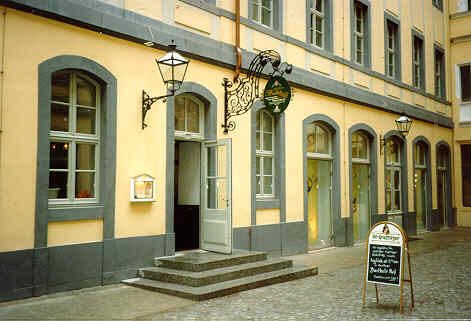
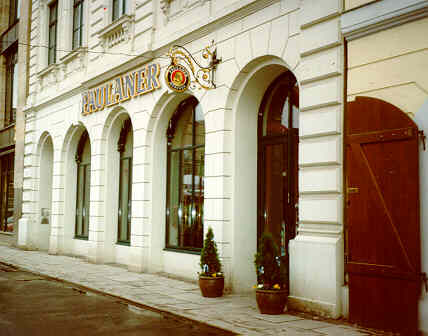
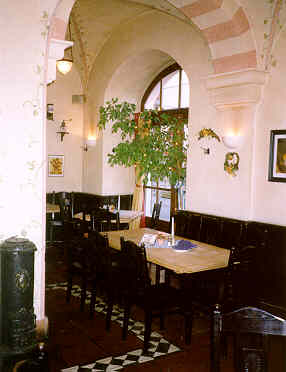 The
reunification of Germany gave Paulaner the chance, in 1990, to reacquire
their former Leipzig showcase. Originally built as a bank, it was later
a coffeehouse before it came into the hands of Paulaner in 1920. It was
confiscated in 1948 and led a checkered existence in the DDR period.
The
reunification of Germany gave Paulaner the chance, in 1990, to reacquire
their former Leipzig showcase. Originally built as a bank, it was later
a coffeehouse before it came into the hands of Paulaner in 1920. It was
confiscated in 1948 and led a checkered existence in the DDR period. 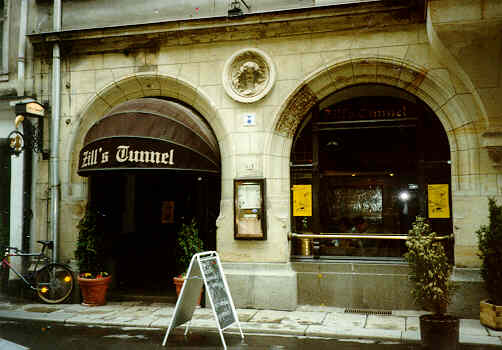
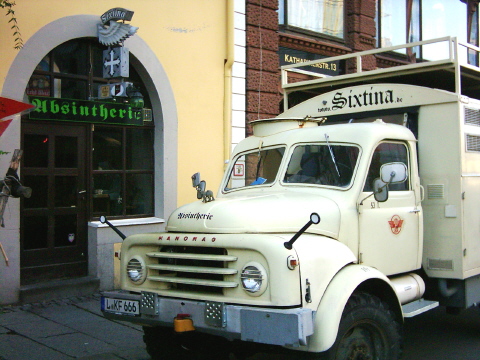
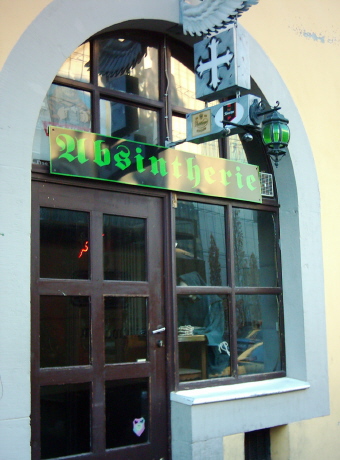 Sixtina
is a bizarre gothic bar in a building that dates from 1545. The vaulted
interior has been decorated like a church, even having a Da Vince-esque
painted ceiling.
Sixtina
is a bizarre gothic bar in a building that dates from 1545. The vaulted
interior has been decorated like a church, even having a Da Vince-esque
painted ceiling.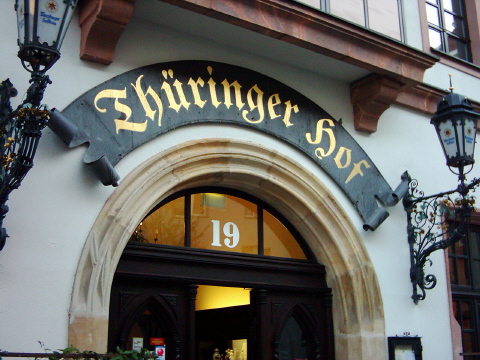
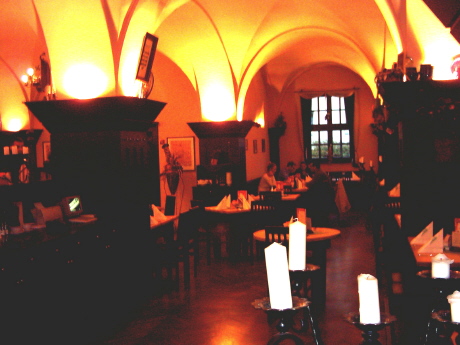 A
traditional beerhall with vaulted ceilings. There´s been a pub called Thüringer
Hof on this spot since 1838. The original was destroyed in 1943 and rebuilt
in 1948 and 1993.
A
traditional beerhall with vaulted ceilings. There´s been a pub called Thüringer
Hof on this spot since 1838. The original was destroyed in 1943 and rebuilt
in 1948 and 1993. 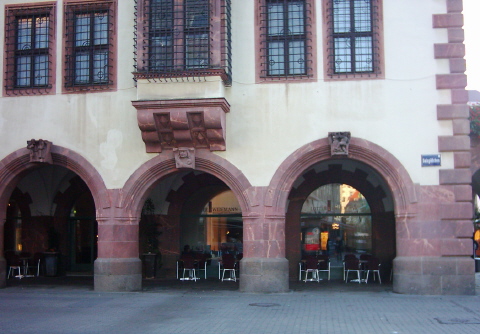
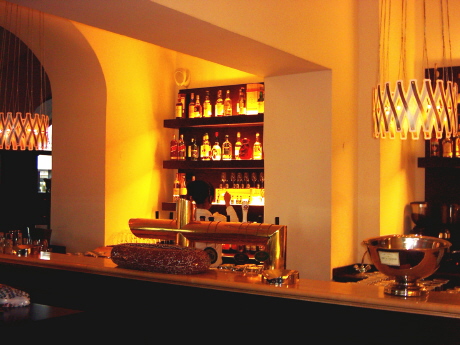 Posh
restaurant bar in the Altes Rathaus, Leipzig's former town hall..
Posh
restaurant bar in the Altes Rathaus, Leipzig's former town hall.. 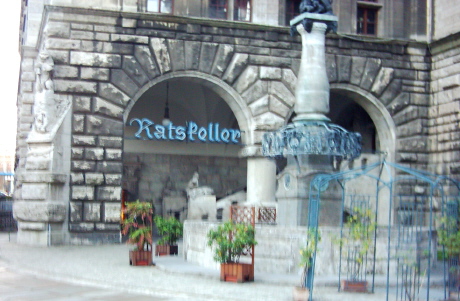
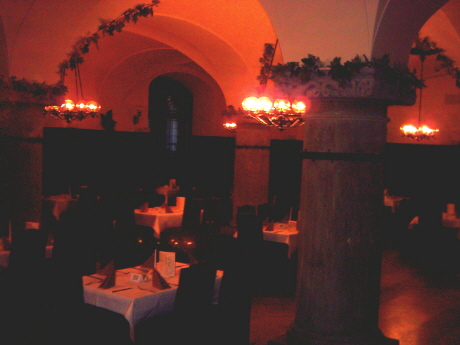 Cellar
restaurant/bar located in the Neues Rathaus (New Town Hall).
Cellar
restaurant/bar located in the Neues Rathaus (New Town Hall).